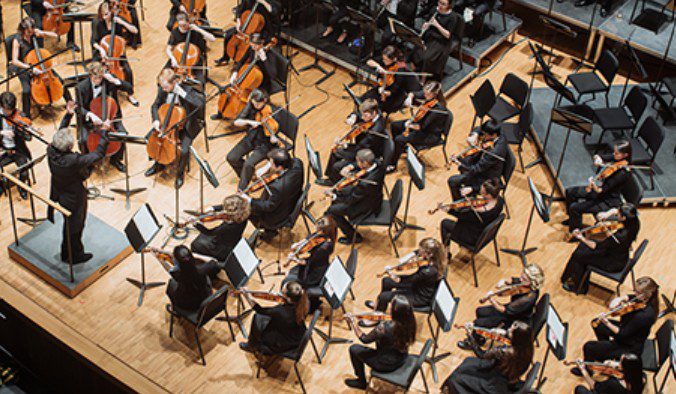The idea of a co-production between the Société de musique contemporaine du Québec and McGill University’s Schulich School of Music is an excellent one. And it’s not a new idea: the two institutions have collaborated in the past.
L’idée d’une coproduction entre la Société de musique contemporaine du Québec et l’École de musique Schulich de l’Université McGill est en soi excellente. Et cette idée n’est pas neuve, les deux institutions ont collaboré par le passé.
What does this relationship look like in 2025? Friday’s evening at the Maison symphonique, in the context of Montréal / Nouvelles Musiques, was an opportunity to think about this.
Over the years, Maestro Alexis Hauser has continued to lead Montreal’s finest student symphony orchestra. At the Maison symphonique, this was certainly the case. Very well behaved. Rigor. Clarity. Cohesive, solid performances, particularly in the more classical works on the program – we’re talking here about Richard Strauss’s symphonic poem Thus Spoke Zarathustra, and Prokofiev’s 2nd Piano Concerto played by Alexey Shafirov, twice winner of the McGill Concerto Competition – precise throughout, lively and tonic in the attack, fluid in general, and at the encore a generous Prelude Op. 3 No. 2 by Rachmaninov.
Au fil du temps, maestro Alexis Hauser dirige encore et toujours le meilleur orchestre symphonique estudiantin à Montréal. À la Maison symphonique, c’était certes le cas. Fort belle tenue. Rigueur. Clarté. Exécutions cohésives, solides, particulièrement dans les œuvres les plus classiques au programme – on parle ici du poème symphonique Ainsi parlait Zarathoustra de Richard Strauss, ainsi que du 2e Concerto pour piano de Prokofiev joué par Alexey Shafirov, lauréat à deux reprises du concours de concertos de McGill – précis sur toute la ligne, vif et tonique dans l’attaque, fluide de manière générale, et au rappel un généreux Prélude op. 3 n° 2 de Rachmaninov.
The final piece on the program, by Richard Strauss, whose main theme was widely popularized as the theme for the film 2001: A Space Odyssey, was also exemplary in the context of a university performance and a floor filled with an audience of mostly students, friends, family and many other open-minded music lovers, all happy to be there.
However, it seems to me that the performance of György Ligeti’s Lontano, played in the first part of the program, demanded more timbral depth, texture and power to carry through the work’s obsessive discourse, based on plays of tension deployed slowly over an unusual (for the time of its creation) linear flow. We had the impression that this very important part of the program, at the heart of its theme, had been less well chiselled, and it was the same for Continental Divide, an SMCQ commission to young composer Liam Gibson, presented as a premiere. Did we really grasp all its nuances?
In the first half, Ligeti’s Musica ricercata, transposed for organ and played by the excellent Jean-Willy Kunz, was impeccable in the context of a transposition.
For the cinematic side of things, there was no question of showing film extracts on the big screen during the orchestral performances. Instead, we opted for scenic evocations of Stanley Kubrick’s great classics: the spectral binoculars from The Shining, the ceremonial mask from Eyes Wide Shut, the famous monolith from 2001, around which primates begin to think like sapiens, and so on. We also tried mapping projections on a rear façade of the amphitheatre – too bright for the projected forms to be intelligible? Good flashes, a certain taste, interesting premises, a certain discretion… How can this evocation of brilliant cinema be maximized in a symphonic performance context? There’s no doubt that the highly gifted Sylvain Marotte will be able to answer this question for the future.For the cinematic side of things, there was no question of showing film extracts on the big screen during the orchestral performances. Instead, we opted for scenic evocations of Stanley Kubrick’s great classics: the spectral binoculars from The Shining, the ceremonial mask from Eyes Wide Shut, the famous monolith from 2001, around which primates begin to think like sapiens, and so on. We also tried mapping projections on a rear façade of the amphitheatre – too bright for the projected forms to be intelligible? Good flashes, a certain taste, interesting premises, a certain discretion… How can this evocation of brilliant cinema be maximized in a symphonic performance context? There’s no doubt that the highly gifted Sylvain Marotte will be able to answer this question for the future.
And then there was a full house that evening, mostly populated by delighted people. That was already a lot for the SMCQ and the McGill Symphony Orchestra. Who, by the way, complained about some of the program’s inconsistencies (Prokofiev for piano and orchestra after Ligeti… why?) and the thinness of some of the performances on the contemporary side. Nevertheless, most of us enjoyed a fine Friday at M/NM.And then there was a full house that evening, mostly populated by delighted people. That was already a lot for the SMCQ and the McGill Symphony Orchestra. Who, by the way, complained about some of the program’s inconsistencies (Prokofiev for piano and orchestra after Ligeti… why?) and the thinness of some of the performances on the contemporary side. Nevertheless, most of us enjoyed a fine Friday at M/NM.
























